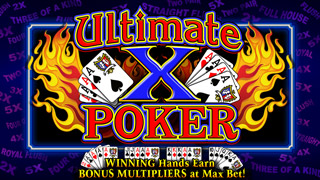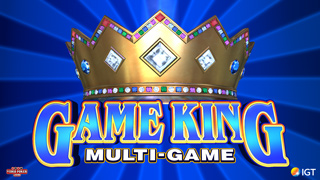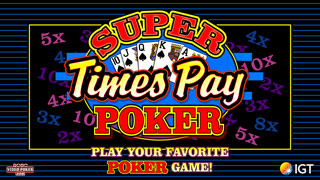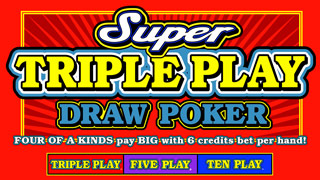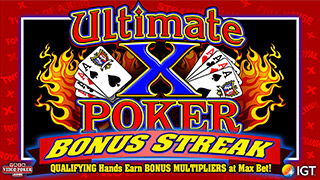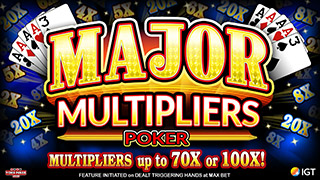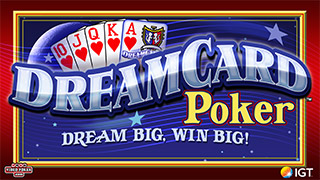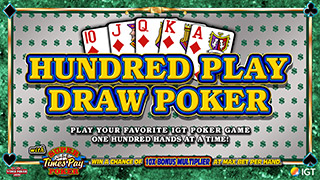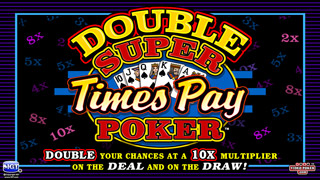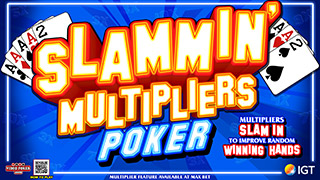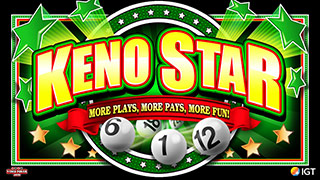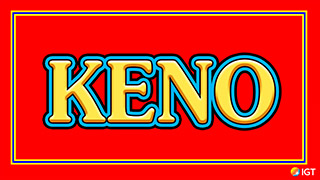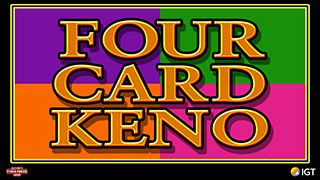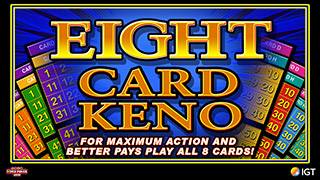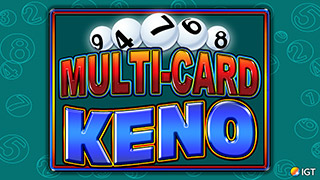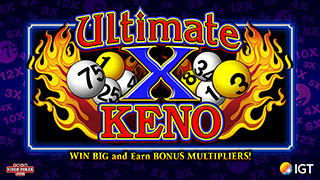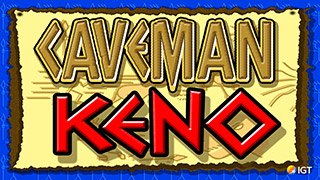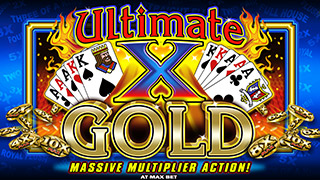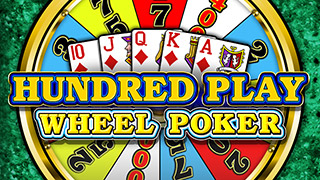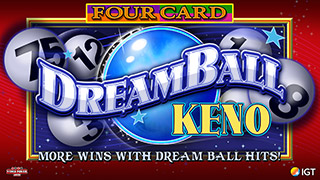Scouting for plays??
-
BillyJoe
- Video Poker Master
- Posts: 3198
- Joined: Sat Aug 23, 2008 2:00 pm
Re: Scouting for plays??
[QUOTE=billy joe]
Frank, are you becoming a convert to my way of thinking? I had said that the more hands that you play, the greater the probability of hitting a specific hand, like a progressive RF. You specifically told me in another thread that playing as a team had no bearing on the overall return on a pay table. But above, you say that RFs are common for a large team, which I believe to be correct, since a team can collectively play more hands than an individual in any segment of time (hour, session, day, year, etc).
ALLELUIA (I think)
You're confusing probability with quantity. Frank is telling you that you'll see the same number of RFs per hand played. The return on investment is exactly the same. All a team does is play more hands, and hence, get more total RFs. However, they also invest more coin-in as well. The net result is the same, they just even out the ups and downs faster.
One other thing that leads to more RFs playing progressives is the strategy changes to go for them more often. So, you might see a RF every 32K hands instead of every 40K hands. However, you give up a little in small payouts as you play which is why the RF has to be bigger for this strategy to pay off.[/QUOTE]
Really (did I see that response somewhere else? ) I don't think I am confusing probability with quantity, since I believe probability is a FUNCTION of quantity. I was not speaking of the total number of RFs, just the next one, which would carry the progressive JP. Any one person on however large a team you may choose to field has the same opportunity to catch that RF on any given hand, just as any one person not playing on that team has that same opportunity. Who will catch that next RF when the gun goes off... who knows? But in a given time time frame, as I said, a member of the team has a greater probability , but not certainty, of that next RF than the non-team individual, assuming that they were playing identical strategies. WHY?? Number of hands played in the same time frame.
If this were not true, why have a team ?
Frank, are you becoming a convert to my way of thinking? I had said that the more hands that you play, the greater the probability of hitting a specific hand, like a progressive RF. You specifically told me in another thread that playing as a team had no bearing on the overall return on a pay table. But above, you say that RFs are common for a large team, which I believe to be correct, since a team can collectively play more hands than an individual in any segment of time (hour, session, day, year, etc).
ALLELUIA (I think)
You're confusing probability with quantity. Frank is telling you that you'll see the same number of RFs per hand played. The return on investment is exactly the same. All a team does is play more hands, and hence, get more total RFs. However, they also invest more coin-in as well. The net result is the same, they just even out the ups and downs faster.
One other thing that leads to more RFs playing progressives is the strategy changes to go for them more often. So, you might see a RF every 32K hands instead of every 40K hands. However, you give up a little in small payouts as you play which is why the RF has to be bigger for this strategy to pay off.[/QUOTE]
Really (did I see that response somewhere else? ) I don't think I am confusing probability with quantity, since I believe probability is a FUNCTION of quantity. I was not speaking of the total number of RFs, just the next one, which would carry the progressive JP. Any one person on however large a team you may choose to field has the same opportunity to catch that RF on any given hand, just as any one person not playing on that team has that same opportunity. Who will catch that next RF when the gun goes off... who knows? But in a given time time frame, as I said, a member of the team has a greater probability , but not certainty, of that next RF than the non-team individual, assuming that they were playing identical strategies. WHY?? Number of hands played in the same time frame.
If this were not true, why have a team ?
-
BillyJoe
- Video Poker Master
- Posts: 3198
- Joined: Sat Aug 23, 2008 2:00 pm
[QUOTE=billy joe]
Correct me if I am wrong, but that % return only mattered to the individual that actually hit the progressive.
Yes and no. For that specific play the answer is yes. However, if a person only plays when they have a similar advantage then they will be the one to hit eventually. It all gets down to playing with a consistent advantage.[/QUOTE]
Sorry, Shadow, but I have to jump on your statement "if a person only plays when they have a similar advantage then they will be the one to hit eventually"
I have to disagree. They have the same opportunity on any given hand, assuming a similar playing strategy, as anyone else. If Joe "One Lucky Pull" sits down next to him and hits the progressive on his first bet, it was not the because of a math error - it just happens sometimes. And if the "consistent advantage" only applies when a progressive RF is in play, not because of the rest of the pay table, then your advantage player can achieve loser stardom as easily as any other player. He HAS to hit that progressive to make that advantage work in his favor.
Correct me if I am wrong, but that % return only mattered to the individual that actually hit the progressive.
Yes and no. For that specific play the answer is yes. However, if a person only plays when they have a similar advantage then they will be the one to hit eventually. It all gets down to playing with a consistent advantage.[/QUOTE]
Sorry, Shadow, but I have to jump on your statement "if a person only plays when they have a similar advantage then they will be the one to hit eventually"
I have to disagree. They have the same opportunity on any given hand, assuming a similar playing strategy, as anyone else. If Joe "One Lucky Pull" sits down next to him and hits the progressive on his first bet, it was not the because of a math error - it just happens sometimes. And if the "consistent advantage" only applies when a progressive RF is in play, not because of the rest of the pay table, then your advantage player can achieve loser stardom as easily as any other player. He HAS to hit that progressive to make that advantage work in his favor.
-
Frank Kneeland
- VP Veteran
- Posts: 762
- Joined: Wed Feb 02, 2011 6:59 pm
OK I put in a 12 hour shift today, so
I'm tired, but I'll try to answer you.
Frank, what you're saying is akin to saying it'll all work out in the
end, and for many many many players it just does not. Teams have to
experience that destructive side as well, and if you say the owner is
made of money then no way would he be into video poker.
Teams not only have a larger volume of
play, they play much larger edges. I am aware of a couple of small
teams that lost money. They were small and under-bankrolled and had
poor players. None of the large teams I talked about in my book
(1970-1990) lost money. None of them. Please note that it is no
longer possible to run a team like those. When I talk about this
stuff it is history.
You're making it sound too good to be
true for these teams, and I'm not even sure casinos allow teams to
converge on their high progressive royal games. At least it doesn't
seem like they would or even should. How could their regular players
and other guests get their shots at these things, and wouldn't that
weigh heavily on how they run the places?Some places
do, some don't. At the places with heat, we just take a couple of
seats and play casual, and make sure to leave seats open for regular
customers. We'll even hold seats for regular folk, watch their
machines while they go to the bathroom, chit chat, timeshare, etc...
We aren't greedy and we're very friendly to everyone. If you have ever
had a Bad Team Player experience, it wasn't one of my friends.
Now I am a little bit disillusioned.
You really don't play with your own money, and you're only a line
employee now and have been like an office manager for some other guy?
I thought you were a video poker pro, no? I'm really confused over
the definition of what a professional really is now. Is Bob Dancer a
pro or maybe hes not because I now don't know if he plays with his
own money or not. Same with RS and any others who say they're pros.
Are pros only those like you who get some salary for playing, or are
they people who make their living from the machines? Is the team
owner a pro? You mean all I have to do is audition for the team
leader at a machine and I'm on a payroll? I can do it in my spare
time.
And I am disillusioned by your
disillusionment. I know I gave you a free book, and I clearly state in the
book that for most of my career I have been SALARY. You're making it
sound as if this was news. It's in the book, and I have never said anything different. The
definition of “a pro” is someone that makes their living
gambling. I qualify and have for two decades. Not being able to lose,
does not disqualify a person from being a professional at any
profession of which I am aware. Typically making your living at
something is the very thing that makes you “a professional”.
What does this mean to you? It means that I experience none of
the agony of victory, or the thrill of defeat and that I can offer
you what is likely the most unbiased, cold and impartial opinion on
gambling you are ever likely going to get anywhere. I have no reason
to exaggerate my wins or understate my losses, since I don't have
any. It is just a job for me, that I neither like nor dislike.
I hope that answers your questions. ~FK
-
Frank Kneeland
- VP Veteran
- Posts: 762
- Joined: Wed Feb 02, 2011 6:59 pm
Frank, are you becoming a convert to my way of thinking? I had said that the more hands that you play, the greater the probability of hitting a specific hand, like a progressive RF.I just meant that because we play more we get more. It's a quantity thing, not a probability issue. Our chance of hitting things is identical to what an individual would experience, since we are IN FACT made up of individuals.~FK
-
Frank Kneeland
- VP Veteran
- Posts: 762
- Joined: Wed Feb 02, 2011 6:59 pm
For many players, that math youre referring to does not work out, and I know a lot of them who have said this to me and on the forums Ive read.Let me help out here. The issue here is the definition of "math working out". You seem to think this means that things will go exactly as expected, and this is exactly what it does not mean.I have run across this issue before.Math predicts that some people will lose and others will win. Therefore, if a person loses on a game where they were expected to win, math is working just fine. "math working out" does not equate to a guarantee of sucess. That wouldn't be probability math and it wouldn't be random.In probability math there are no guarantees, only best guesses, and results neither invalidate OR confirm anything.If one plays a game where the math says they SHOULD win, that does not mean that they WILL win. It means that winning is more likely than losing. Some will still lose. More should win. It's a best guess. At one point or another in our lives, we have all made best guesses and likely they haven't all been right. The important thing is to make them with as much and as accurate information as you can. In gambling this means learning math.Math does work for the winners, for the casinos, for the losers, for everyone, but no one gets a guarantee. Hay, it isn't called "gambling" for nothing.~FK
-
Frank Kneeland
- VP Veteran
- Posts: 762
- Joined: Wed Feb 02, 2011 6:59 pm
Really (did I see that response somewhere else? ) I don't think I am confusing probability with quantity, since I believe probability is a FUNCTION of quantity. I was not speaking of the total number of RFs, just the next one, which would carry the progressive JP.If a person has played 32,000 hands their chance to hit a RF is XIf a team has played 32,000 hands their chance to hit the RF is also XThe only variable is TIME.It takes a team of 10 people 1/10 as long to play 32,000 hands and have X chance of hitting the JP.TIME is all that changes. And I' out of it. Good night all. Hope I was helpful.~FK
-
shadowman
- Video Poker Master
- Posts: 3587
- Joined: Mon Oct 23, 2006 5:42 pm
[QUOTE=shadow man]
You're confusing probability with quantity. Frank is telling you that you'll see the same number of RFs per hand played. The return on investment is exactly the same. All a team does is play more hands, and hence, get more total RFs. However, they also invest more coin-in as well. The net result is the same, they just even out the ups and downs faster.
One other thing that leads to more RFs playing progressives is the strategy changes to go for them more often. So, you might see a RF every 32K hands instead of every 40K hands. However, you give up a little in small payouts as you play which is why the RF has to be bigger for this strategy to pay off.
Really (did I see that response somewhere else? ) I don't think I am confusing probability with quantity, since I believe probability is a FUNCTION of quantity. I was not speaking of the total number of RFs, just the next one, which would carry the progressive JP. Any one person on however large a team you may choose to field has the same opportunity to catch that RF on any given hand, just as any one person not playing on that team has that same opportunity. Who will catch that next RF when the gun goes off... who knows? But in a given time time frame, as I said, a member of the team has a greater probability , but not certainty, of that next RF than the non-team individual, assuming that they were playing identical strategies. WHY?? Number of hands played in the same time frame.
If this were not true, why have a team ? [/QUOTE]
The big reason to have a team is to even out the wins and losses. It also may help in getting more scouting done and locking up plays occasionally. Otherwise, it provides no advantage. You see, if a team of ten players hits a RF 10 times faster they also end up splitting the pot 10 ways. Hence, a team member requires 10 jackpots to every one for the individual. So, on average, it still takes a team player the same amount of time to make the same amount of money (assuming they play the same amount of time).
You're confusing probability with quantity. Frank is telling you that you'll see the same number of RFs per hand played. The return on investment is exactly the same. All a team does is play more hands, and hence, get more total RFs. However, they also invest more coin-in as well. The net result is the same, they just even out the ups and downs faster.
One other thing that leads to more RFs playing progressives is the strategy changes to go for them more often. So, you might see a RF every 32K hands instead of every 40K hands. However, you give up a little in small payouts as you play which is why the RF has to be bigger for this strategy to pay off.
Really (did I see that response somewhere else? ) I don't think I am confusing probability with quantity, since I believe probability is a FUNCTION of quantity. I was not speaking of the total number of RFs, just the next one, which would carry the progressive JP. Any one person on however large a team you may choose to field has the same opportunity to catch that RF on any given hand, just as any one person not playing on that team has that same opportunity. Who will catch that next RF when the gun goes off... who knows? But in a given time time frame, as I said, a member of the team has a greater probability , but not certainty, of that next RF than the non-team individual, assuming that they were playing identical strategies. WHY?? Number of hands played in the same time frame.
If this were not true, why have a team ? [/QUOTE]
The big reason to have a team is to even out the wins and losses. It also may help in getting more scouting done and locking up plays occasionally. Otherwise, it provides no advantage. You see, if a team of ten players hits a RF 10 times faster they also end up splitting the pot 10 ways. Hence, a team member requires 10 jackpots to every one for the individual. So, on average, it still takes a team player the same amount of time to make the same amount of money (assuming they play the same amount of time).
-
BillyJoe
- Video Poker Master
- Posts: 3198
- Joined: Sat Aug 23, 2008 2:00 pm
[QUOTE=billyjoe][QUOTE=shadow man]
You're confusing probability with quantity. Frank is telling you that you'll see the same number of RFs per hand played. The return on investment is exactly the same. All a team does is play more hands, and hence, get more total RFs. However, they also invest more coin-in as well. The net result is the same, they just even out the ups and downs faster.
One other thing that leads to more RFs playing progressives is the strategy changes to go for them more often. So, you might see a RF every 32K hands instead of every 40K hands. However, you give up a little in small payouts as you play which is why the RF has to be bigger for this strategy to pay off.
Really (did I see that response somewhere else? ) I don't think I am confusing probability with quantity, since I believe probability is a FUNCTION of quantity. I was not speaking of the total number of RFs, just the next one, which would carry the progressive JP. Any one person on however large a team you may choose to field has the same opportunity to catch that RF on any given hand, just as any one person not playing on that team has that same opportunity. Who will catch that next RF when the gun goes off... who knows? But in a given time time frame, as I said, a member of the team has a greater probability , but not certainty, of that next RF than the non-team individual, assuming that they were playing identical strategies. WHY?? Number of hands played in the same time frame.
If this were not true, why have a team ? [/QUOTE]
The big reason to have a team is to even out the wins and losses. It also may help in getting more scouting done and locking up plays occasionally. Otherwise, it provides no advantage. You see, if a team of ten players hits a RF 10 times faster they also end up splitting the pot 10 ways. Hence, a team member requires 10 jackpots to every one for the individual. So, on average, it still takes a team player the same amount of time to make the same amount of money (assuming they play the same amount of time).[/QUOTE]
So, Shadow, you ARE agreeing with me.. If the goal is to get the NEXT RF, because that is when the progressive is the highest, a 10 person team has a better chance than any single individual. Who said anything about one member of the team making money?
You're confusing probability with quantity. Frank is telling you that you'll see the same number of RFs per hand played. The return on investment is exactly the same. All a team does is play more hands, and hence, get more total RFs. However, they also invest more coin-in as well. The net result is the same, they just even out the ups and downs faster.
One other thing that leads to more RFs playing progressives is the strategy changes to go for them more often. So, you might see a RF every 32K hands instead of every 40K hands. However, you give up a little in small payouts as you play which is why the RF has to be bigger for this strategy to pay off.
Really (did I see that response somewhere else? ) I don't think I am confusing probability with quantity, since I believe probability is a FUNCTION of quantity. I was not speaking of the total number of RFs, just the next one, which would carry the progressive JP. Any one person on however large a team you may choose to field has the same opportunity to catch that RF on any given hand, just as any one person not playing on that team has that same opportunity. Who will catch that next RF when the gun goes off... who knows? But in a given time time frame, as I said, a member of the team has a greater probability , but not certainty, of that next RF than the non-team individual, assuming that they were playing identical strategies. WHY?? Number of hands played in the same time frame.
If this were not true, why have a team ? [/QUOTE]
The big reason to have a team is to even out the wins and losses. It also may help in getting more scouting done and locking up plays occasionally. Otherwise, it provides no advantage. You see, if a team of ten players hits a RF 10 times faster they also end up splitting the pot 10 ways. Hence, a team member requires 10 jackpots to every one for the individual. So, on average, it still takes a team player the same amount of time to make the same amount of money (assuming they play the same amount of time).[/QUOTE]
So, Shadow, you ARE agreeing with me.. If the goal is to get the NEXT RF, because that is when the progressive is the highest, a 10 person team has a better chance than any single individual. Who said anything about one member of the team making money?
-
backsider
- VP Veteran
- Posts: 578
- Joined: Sun May 08, 2011 11:35 pm
[QUOTE=backsider] Shadowman, a line item response, really?
Really.
Is this how you react when embarrassed?
Now why would I ever be embarrassed? I simply provided you with accurate information. Only one of us could possibly be embarrassed and they might even start projecting that situation.
All youve restated is that you rely on the math working out for players but for the ones that it does not work out for, youre in denial about. You also doubletalked your way out of providing actual evidence for any of your claims Ive read on various forums that you win just as the math says. If its so simple and provable then prove to me your actual experience. See if you can do it without using theory or expectation. Id like some real information please. Or will you continue to be like Arnold and say "Trust Me!"
You still seem to be confused. The "math" does not guarantee anyone will walk away a winner. You've been told that many times. What the math does is allow us to examine the chances (likelihood if you prefer) for future success and to determine the best way of getting the most out of our money. Yes, given the right opportunity (known as a positive edge), the chances for winning can be extremely good. But, as I tried to get across in my last comment, life itself is a risk with no guarantees, gambling is just an extension of that.[/QUOTE] From all that garble, Id have to say that you are embarrassed about not being able to provide actual proof that youve won or that anyone you claim to know has won. You just want it all to be a theory and leave it at that (no matter how it makes you look, even to your silly gang here who are probably as red-faced as a pack of tomatoes.)
-
backsider
- VP Veteran
- Posts: 578
- Joined: Sun May 08, 2011 11:35 pm
Frank, thank you for clearing that up. I did read what you said in your book, but upon reading the forums I was getting another picture. No, Ive never run into any teams that I would know of at least, and if your team doesnt hog the machines then you are all gentlemen. My mom was a lifelong secretary and my dad was a supervisor with the city maintenance dept who were both on a salary. I cant see calling her a professional secretary or my dad a professional anything. A title doesnt really mean that much anyway the way I see it. What Im still a little perplexed at is that both you and the other two guys call yourselves professional gamblers or whatever the right term is, but you have totally opposite ways of doing what you do. I see them as gamblers and you really arent since you risk nothing. Thats why I asked the question.



